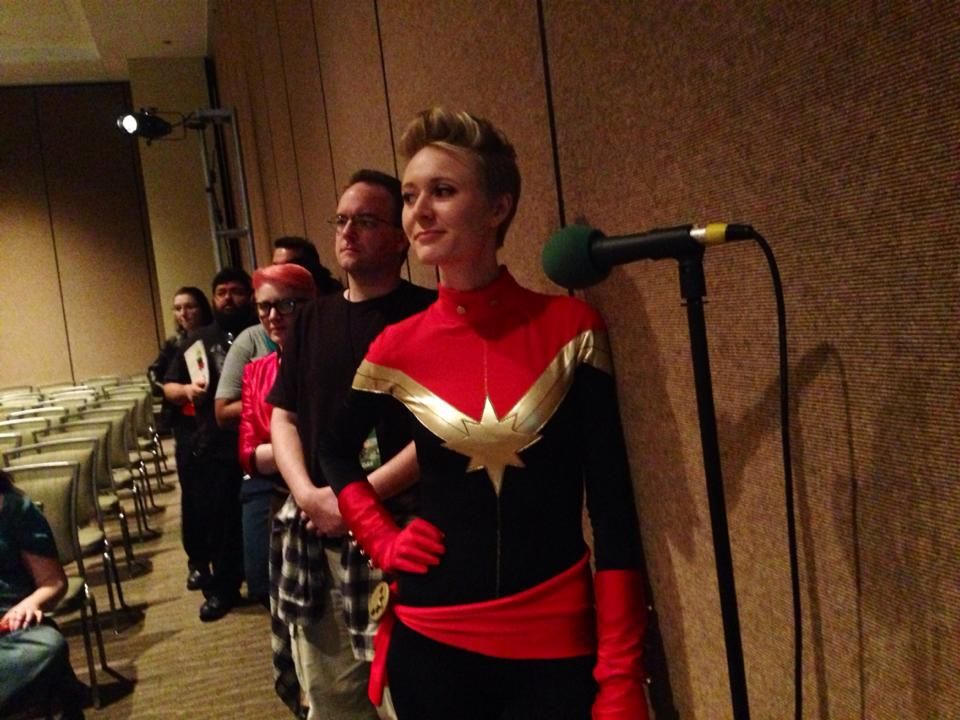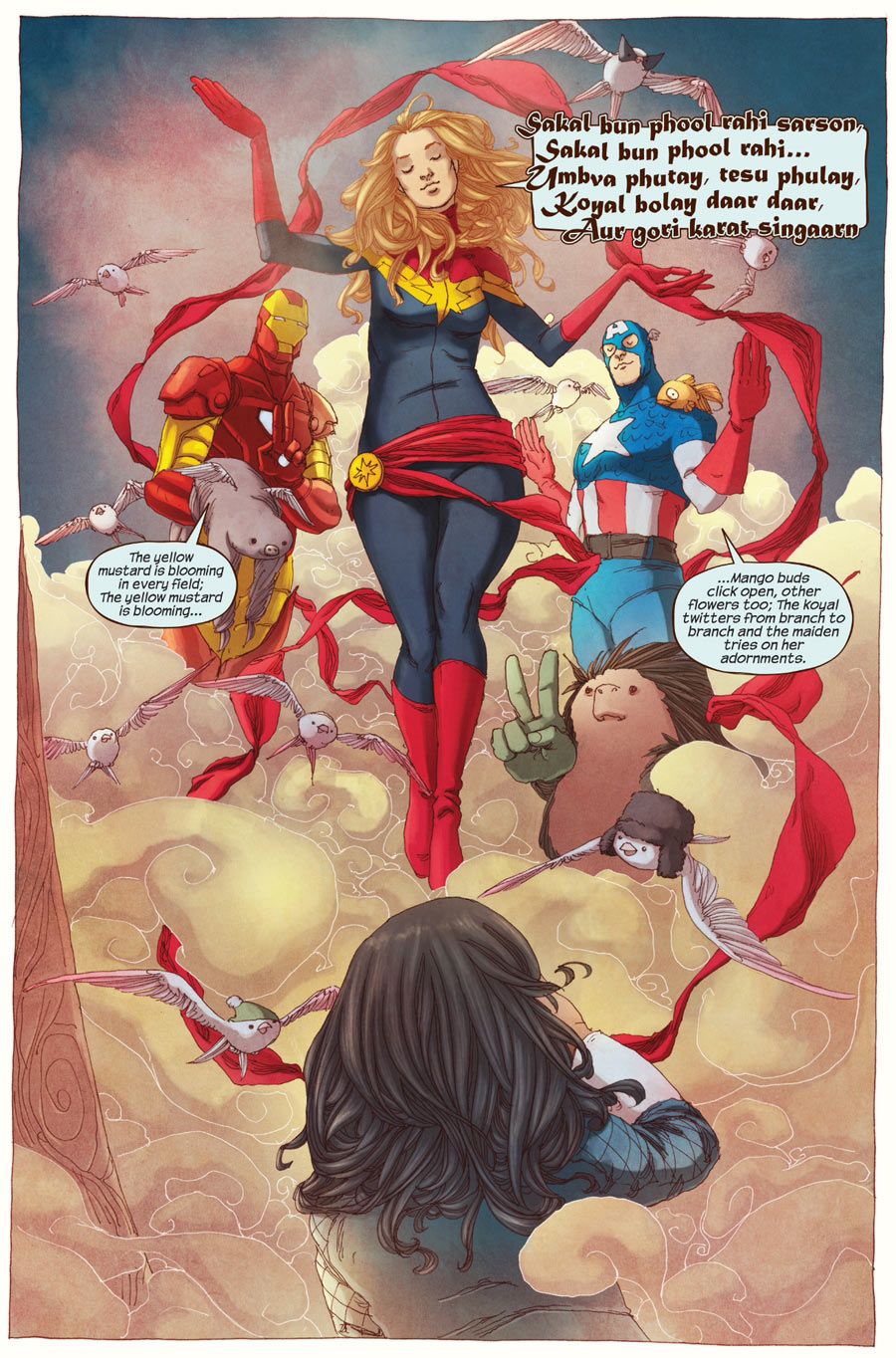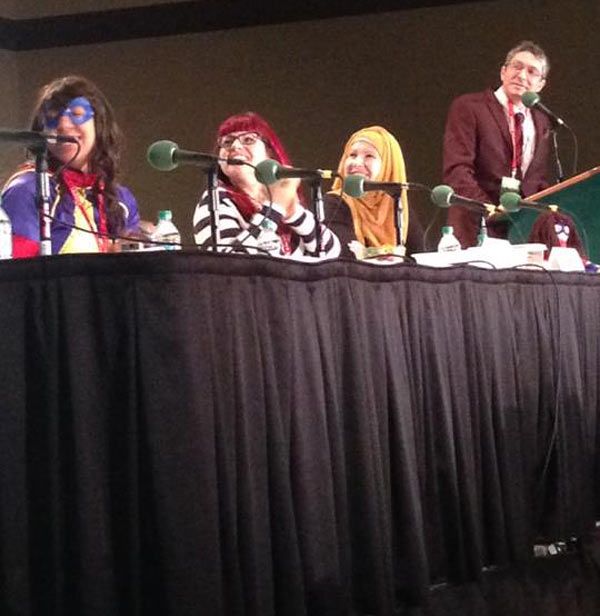Nothing dominated Emerald City Comicon 2014 quite like the Carol Corps. Between the Carol Corps Superhero Airline Cocktail Party Thursday night, various Corps meet ups and the well-attended Sunday morning panel, fans of the badass heroes (Captain and Ms. Marvel) brought a spirit of community to the convention.
Ten minutes before the panel started, Carol Corps members passed homemade cookies (in the shapes of Carol's F-15, stars, bolts and dinosaurs, thankyouverymuch) around the crowded room while waiting for panelists to arrive. Cosplayers decked out in seriously legit Carol/Kamala gear took photos, greeted friends and welcomed new faces into the Corps -- and when Kelly Sue DeConnick and G. Willow Wilson entered the room, cheers erupted like a fiery feminist volcano.
The always-gracious DeConnick, laden with presents for the audience, paused on her way to the stage to take selfies and give hugs. Accompanying Wilson was her handmade Kamala yarn doll, which kept watch over the audience from the stage. Nakki, a prominent member of the Carol Corps, joined the panel with gifts that she had made. She passed the bag to DeConnick, whose eyes lit up when she looked inside.
"I want to actually toss these out to you," she said. "But they are, in fact, throwing stars, and that seems wildly unsafe. They are super fucking cool!"
Nakki, who in her civilian life is a rocket scientist, made hundreds of acrylic Hala Stars (Captain Marvel's logo) with lighting bolts in the center after Ms. Marvel's logo -- and they were ridiculously sharp. DeConnick passed the bag around the room for people to share as the panel began, with moderator Prof. Ben Saunders taking the stage.
RELATED: Wilson Shapeshifts the Heroic Legacy of "Ms. Marvel"
Saunders relayed a story of a dinner he shared with DeConnick right after she had received the first pages of "Captain Marvel." "One of the things you had to do in revising comics history was take Carol and turn her from a victim into -- well, something else," he said.
Saunders showed photos of the original Captain Marvel origins story next to the pages from DeConnick's story. The differences between the two characters are staggering, with 60s Carol a cowering damsel in distress and present day Carol a force to be reckoned with.
DeConnick explained that what she had initially written as Carol's origin story involved a time travel paradox, which would've put modern day Carol Danvers and Helen Cobb back at the site where Carol received her powers. DeConnick explained that she wanted Mar-Vell to rescue Helen and contemporary Carol to pick up her younger self when the Psyche-Magnitron exploded. This would've transferred the powers from Mar-Vell to Helen, and from contemporary Carol to young Carol, making her the source of her own power. DeConnick explained why this wasn't the direction her story ended up taking.
"The note that came back was that it was a pretty severe change," she said, acknowledging that Captain Marvel is not her character and she had no issues with the ultimate decision. "They said it was pretty weird -- and they're not wrong. Introducing an origin that has a time travel paradox is kind of weird, and we can debate if that's weirder than a Psyche-Magnitron," she laughed.
Saunders interjected, "I think by 'weird' what they meant was 'brilliantly original' and 'obviously feminist.'" The audience shouted cheers of agreement.
The discussion turned to Wilson's origin moment for Kamala Khan. A Muslim teenager living in Jersey City, Kamala is the first non-white iteration of the Ms. Marvel character. The tone of her origin isn't very different from what DeConnick had hoped to do in her book, with Kamala, under the effects of the Terrigen Mists currently blanketing the Marvel Universe, hallucinating Carol Danvers appearing and gifting her with powers while Iron Man is holding a sloth. With wings. It's a gloriously weird and perfect moment where you can really see how important heroism and transformation are to Kamala. On the page, Carol recites an Urdu poem, which is Kamala's birth language.
"It was not a terribly philosophical choice," Wilson explained. "When I was thinking about this scene, we find out very early on that Kamala is a geek girl. She writes fan fiction in which we've seen this trio of characters fighting a giant kaiju monster on Planet Unicorn. I wanted to show in that origin moment Kamala's social self, her self-consciously constructed self, but also underneath that she has the cultural heritage of her parents. She would've grown up speaking Urdu at home and not English, and so in this moment of unconsciousness where she is hallucinating but at the same time in the deepest levels of her subconscious, these heroes would be speaking her birth language. It's a poem in Urdu, and it's the sort of poem you'd memorize if you grew up in a particularly literate Urdu-speaking household. The poem itself sort of makes sense in the context, it's about spring and opening up and a maiden trying on her adornments. And at the same time, it's the sort of thing that would pop into your head at a really weird moment!"
Turning to the audience for questions, the first was for Wilson, wondering how Kamala would fit in with the Inhumans and if her identity as an alien would pose an internal conflict.
"For sure," Wilson replied. "She has no idea why this has happened to her still, but once she finds that out -- which we'll be starting to tease in a couple of issues -- she will want to go and find out where the other people like her are. That's definitely going to be there. If you were a girl like Kamala and you already had a Pakistani Muslim family on one side, and the other side you grew up in the U.S and all of a sudden you've got super powers, and then you'll find out that you're secretly an alien -- in so many ways this series is about identity and whether or not it's necessary to choose one box. That's why we made her a shape-shifter. In our heart of hearts, even though the world is changing so fast, we're a little suspicious of people who check more than one box. Kamala is, in many ways, the new normal. We're all coming out of our various closets and recognizing that we're more than one thing, and that's a big part of who she is."
The next question was for all three panelists. Carol's costume revamp and no-nonsense attitude have stood up against the temptation for other creators to put her in gross situations, such as being belittled or experiencing micro-aggressions based on her gender, but in the real world, that doesn't happen. How do the panelists negotiate writing a female character that obviously won't stand for that behavior while not actually showing her experiencing it?
Saunders was the first to respond. "You know, Ms. Marvel gets the brush off from Iron Man for being a woman in [the animated] 'Super Hero Squad' all the time. That's a version of the Marvel Universe that's in its own bubble, but it's also the one aimed at the youngest audience. She's hysterical, and they treat her like she's on the rag all the time. And that's how she's done."
DeConnick said, in kid's literature where things are often oversimplified, characters are given only one quality to put forward, leading people to confuse vocation with character. "Carol is military, ergo she must be super uptight and bossy," she explained.
DeConnick shared her own stance on the pejorative use of the word 'bossy' and how it has been thrown around as a way to criticize an opinionated woman. While she has friends encourage her to embrace the word, DeConnick has a different point of view. "Yeah, we should own 'bossy' and we should own 'bitch' and that's really easy to say because I'm a 43-year old woman and fuck you, but my daughter is four, and it hurts her. She doesn't know how to own that. So if we can get in the habit of just not doing that, that would be awesome."
DeConnick went on to say that it's important for her to speak up, take deep breaths, and forgive herself when she can't challenge the sexism she sees. "Every time I'm willing to open my mouth and risk making someone uncomfortable or not like me or call me a bitch," she continued, "is one time she might not have to do that."
Nakki shared her own experiences as a woman in the aerospace industry, where she is mistaken for an assistant instead of the principal investigator on projects, and how Carol has inspired her to own what she's good at. "I'm damn good at making satellites -- I'm amazing. I went from nothing three weeks ago to a patent application last week. I'm good at what I do. A lot of times, people don't acknowledge that because I'm super weird at work, and you just have to own those things."
Nakki tries to pass her knowledge to her community by mentoring young girls, teaching them to build rockets and embrace their intelligence without uncertainties in their abilities. "I feel like I can pass to them a little bit of confidence and owning their own knowledge. What I try and take from these comics is a woman people can look up to and emulate, and if you emulate any part of her, you're doing great. You're doing awesome."
"Maybe she should face some of those indignities," DeConnick suggested, speaking of Carol Danvers. The audience agreed.
Wilson joined in. "In a lot of subtle ways, girls from a young age are taught to give up. Something that has been of immense benefit to me over the course of my career is being able to differentiate between the things that are difficult, and the things that are merely complicated. All I need to do is have the patience to go from step A to step B," she said. "That's a way of thinking that's very linear and logical, and we're used to thinking that it's the way dudes think and the way girls think is spacy and emotional, but that's total bull."
She continued, speaking to the times where difficulties and complications make it seem impossible to achieve goals, especially in environments where women aren't treated with respect. "You do yourself a tremendous favor when you stick it out. A lot of those micro-aggressions that we've been talking about are to prevent you from sticking it out. You put on the blinders, you have a goal, and you go through all the steps until you get there."
Asked if Kamala, as a shape-shifter, would ever swap gender, Wilson speculated that it probably wouldn't occur to Kamala as an issue until she tried to do it. "That's an interesting question and I thought a little bit about it when we sat down to plan out her powers. Going back to the checking a box thing, I think the reason that shape shifters in superherodom are typically cast as chaotic neutral, a la Loki, or as bad guys, a la Mystique, is maybe because we're automatically assuming that if you can be all of the things, then you're obviously hiding something. Kamala is, in her own way, somewhat sheltered. She's the sort of person who does good because she thinks it's the right thing to do, and as she gets further and further into things and realizes how difficult it is sometimes to distinguish what is good, she'll have to bump up against a lot of what her powers mean. That's one of those things that I feel like will only start talking to me when I start writing. Right now, I feel like I'm just taking dictation; Kamala will tell me how she feels."
At this point, DeConnick paused to ask if the handmade stars had made it around the room. When it became clear that a large chunk of people hadn't yet received one, audience members with multiples immediately got out of their seats to make sure no one was left out. "I love that this is a community that takes such good care of each other," the writer beamed.
And she's right. The Carol Corps panel was by far one of the most engaging, encouraging hours I've ever experienced at a convention. Spending time with passionate, articulate, intelligent fans and the creators who respect them was inspiring. DeConnick is immersed in the community behind Carol Danvers and treats her fans like they are guests in her home -- with love, warmth and an abundance of humor. The women on the panel aren't just focusing on telling good stories about women, but on telling smart, unique stories about all people. This isn't an environment of exclusion, but one of celebration in its purest form -- and that is what conventions are supposed to be about.



